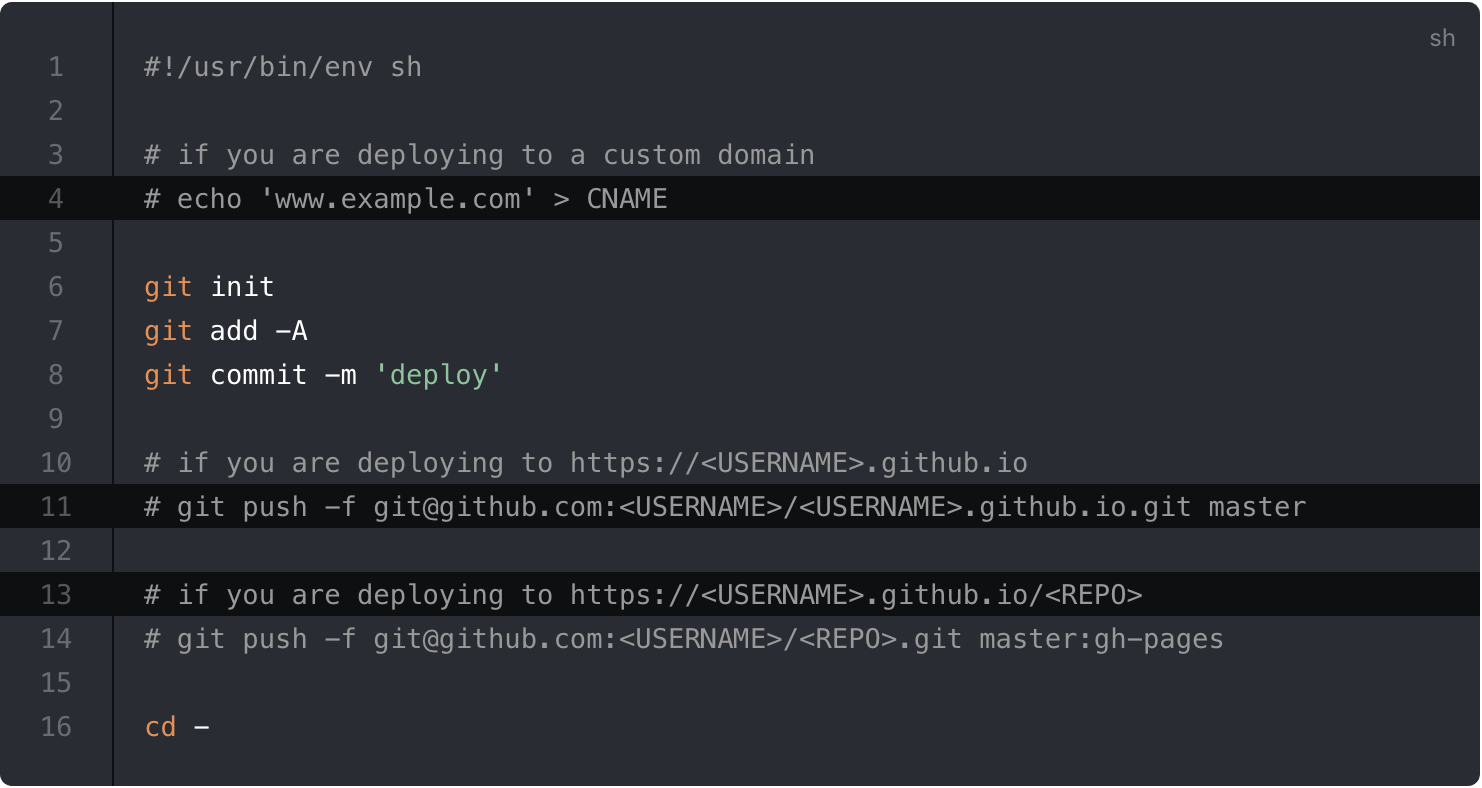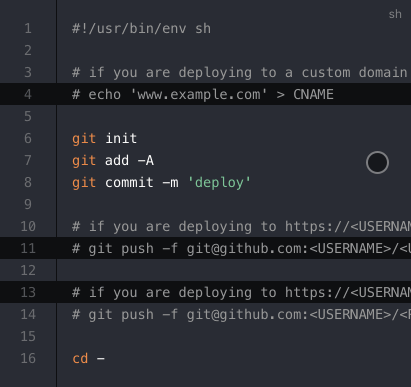Markdown Extensions
Header Anchors
Headers automatically get anchor links applied. Rendering of anchors can be configured using the markdown.anchor option.
Links
Internal Links
Internal links are converted to <router-link> for SPA navigation. Also, every README.md or index.md contained in each sub-directory will automatically be converted to index.html, with corresponding URL /.
For example, given the following directory structure:
.
├─ README.md
├─ foo
│ ├─ README.md
│ ├─ one.md
│ └─ two.md
└─ bar
├─ README.md
├─ three.md
└─ four.md
And providing you are in foo/one.md:
[Home](/) <!-- Sends the user to the root README.md -->
[foo](/foo/) <!-- Sends the user to index.html of directory foo -->
[foo heading](./#heading) <!-- Anchors user to a heading in the foo README file -->
[bar - three](../bar/three.md) <!-- You can append .md (recommended) -->
[bar - four](../bar/four.html) <!-- Or you can append .html -->
Redirection for URLs
KduPress supports redirecting to clean links. If a link /foo is not found, KduPress will look for a existing /foo/ or /foo.html. Conversely, when one of /foo/ or /foo.html is not found, KduPress will try the other.
TIP
Regardless of whether the permalink and clean-urls plugins are used, your relative path should be defined by the current file structure. In the above example, even though you set the path of /foo/one.md to /foo/one/, you should still access /foo/two.md via ./two.md.
Page Suffix
Pages and internal links get generated with the .html suffix by default.
You can customize this by setting config.markdown.pageSuffix.
External Links
Outbound links automatically get target="_blank" rel="noopener noreferrer":
You can customize the attributes added to external links by setting config.markdown.externalLinks.
Frontmatter
YAML frontmatter (opens new window) is supported out of the box:
---
title: Blogging Like a Hacker
lang: en-US
---
This data will be available to the rest of the page, along with all custom and theming components.
For more details, see Frontmatter.
GitHub-Style Tables
Input
| Tables | Are | Cool |
| ------------- |:-------------:| -----:|
| col 3 is | right-aligned | $1600 |
| col 2 is | centered | $12 |
| zebra stripes | are neat | $1 |
Output
| Tables | Are | Cool |
|---|---|---|
| col 3 is | right-aligned | $1600 |
| col 2 is | centered | $12 |
| zebra stripes | are neat | $1 |
Emoji 🎉
Input
:tada: :100:
Output
🎉 💯
A list of all emojis (opens new window) is available.
Table of Contents
Input
[[toc]]
Output
Rendering of the TOC can be configured using the markdown.toc option.
Custom Containers default theme
Custom containers can be defined by their types, titles, and contents.
Default Title
Input
::: tip
This is a tip
:::
::: warning
This is a warning
:::
::: danger
This is a dangerous warning
:::
::: details
This is a details block, which does not work in IE / Edge
:::
Output
TIP
This is a tip
WARNING
This is a warning
WARNING
This is a dangerous warning
This is a details block, which does not work in Internet Explorer or Edge.
Custom Title
Input
::: danger STOP
Danger zone, do not proceed
:::
::: details Click me to view the code
```js
console.log('Hello, KduPress!')
```
:::
Output
STOP
Danger zone, do not proceed
Click me to view the code
console.log('Hello, KduPress!')
Syntax Highlighting in Code Blocks
KduPress uses Prism (opens new window) to highlight language syntax in Markdown code blocks, using coloured text. Prism supports a wide variety of programming languages. All you need to do is append a valid language alias to the beginning backticks for the code block:
Input
``` js
export default {
name: 'MyComponent',
// ...
}
```
Output
export default {
name: 'MyComponent',
// ...
}
Input
``` html
<ul>
<li
k-for="todo in todos"
:key="todo.id"
>
{{ todo.text }}
</li>
</ul>
```
Output
<ul>
<li
k-for="todo in todos"
:key="todo.id"
>
{{ todo.text }}
</li>
</ul>
A list of valid languages (opens new window) is available on Prism’s site.
Line Highlighting in Code Blocks
Input
``` js{4}
export default {
data () {
return {
msg: 'Highlighted!'
}
}
}
```
Output
export default {
data () {
return {
msg: 'Highlighted!'
}
}
}
In addition to a single line, you can also specify multiple single lines, ranges, or both:
- Line ranges: for example
{5-8},{3-10},{10-17} - Multiple single lines: for example
{4,7,9} - Line ranges and single lines: for example
{4,7-13,16,23-27,40}
Input
``` js{1,4,6-7}
export default { // Highlighted
data () {
return {
msg: `Highlighted!
This line isn't highlighted,
but this and the next 2 are.`,
motd: 'KduPress is awesome',
lorem: 'ipsum',
}
}
}
```
Output
export default { // Highlighted
data () {
return {
msg: `Highlighted!
This line isn't highlighted,
but this and the next 2 are.`,
motd: 'KduPress is awesome',
lorem: 'ipsum',
}
}
}
Line Numbers
You can enable line numbers for each code blocks via config:
module.exports = {
markdown: {
lineNumbers: true
}
}
- Demo:


Import Code Snippets beta
You can import code snippets from existing files via following syntax:
<<< @/filepath
It also supports line highlighting:
<<< @/filepath{highlightLines}
Input
<<< @/../@kdupress/markdown/__tests__/fragments/snippet.js{2}
Output
export default function () {
// ..
}
TIP
Since the import of the code snippets will be executed before webpack compilation, you can’t use the path alias in webpack. The default value of @ is process.cwd().
You can also use a VS Code region (opens new window) to only include the corresponding part of the code file. You can provide a custom region name after a # following the filepath (snippet by default):
Input
<<< @/../@kdupress/markdown/__tests__/fragments/snippet-with-region.js#snippet{1}
Code file
// #region snippet
function foo () {
return ({
dest: '../../kdupress',
locales: {
'/': {
lang: 'en-US',
title: 'KduPress',
description: 'Kdu-powered Static Site Generator'
},
'/vi/': {
lang: 'vi-VN',
title: 'KduPress',
description: 'Trình tạo trang tĩnh do Kdu cung cấp'
}
},
head: [
['link', { rel: 'icon', href: `/logo.png` }],
['link', { rel: 'manifest', href: '/manifest.json' }],
['meta', { name: 'theme-color', content: '#3eaf7c' }],
['meta', { name: 'apple-mobile-web-app-capable', content: 'yes' }],
['meta', { name: 'apple-mobile-web-app-status-bar-style', content: 'black' }],
['link', { rel: 'apple-touch-icon', href: `/icons/apple-touch-icon-152x152.png` }],
['link', { rel: 'mask-icon', href: '/icons/safari-pinned-tab.svg', color: '#3eaf7c' }],
['meta', { name: 'msapplication-TileImage', content: '/icons/msapplication-icon-144x144.png' }],
['meta', { name: 'msapplication-TileColor', content: '#000000' }]
]
})
}
// #endregion snippet
export default foo
Output
function foo () {
return ({
dest: '../../kdupress',
locales: {
'/': {
lang: 'en-US',
title: 'KduPress',
description: 'Kdu-powered Static Site Generator'
},
'/vi/': {
lang: 'vi-VN',
title: 'KduPress',
description: 'Trình tạo trang tĩnh do Kdu cung cấp'
}
},
head: [
['link', { rel: 'icon', href: `/logo.png` }],
['link', { rel: 'manifest', href: '/manifest.json' }],
['meta', { name: 'theme-color', content: '#3eaf7c' }],
['meta', { name: 'apple-mobile-web-app-capable', content: 'yes' }],
['meta', { name: 'apple-mobile-web-app-status-bar-style', content: 'black' }],
['link', { rel: 'apple-touch-icon', href: `/icons/apple-touch-icon-152x152.png` }],
['link', { rel: 'mask-icon', href: '/icons/safari-pinned-tab.svg', color: '#3eaf7c' }],
['meta', { name: 'msapplication-TileImage', content: '/icons/msapplication-icon-144x144.png' }],
['meta', { name: 'msapplication-TileColor', content: '#000000' }]
]
})
}Advanced Configuration
KduPress uses markdown-it (opens new window) as the Markdown renderer. A lot of the extensions above are implemented via custom plugins. You can further customize the markdown-it instance using the markdown option in .kdupress/config.js:
module.exports = {
markdown: {
// options for markdown-it-anchor
anchor: { permalink: false },
// options for markdown-it-toc
toc: { includeLevel: [1, 2] },
extendMarkdown: md => {
// use more markdown-it plugins!
md.use(require('markdown-it-xxx'))
}
}
}